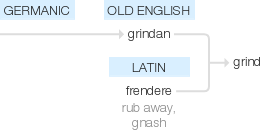Grind
Old English grindan, probably of Germanic origin. Although no cognates are known, it may be distantly related to Latin frendere ‘rub away, gnash’.
wiktionary
From Middle English grynden, from Old English grindan, (cognate with Dutch grinden(“to grind”, rare) and grind(“gravel, shingle”), from Proto-Germanic *grindaną, from Proto-Indo-European *gʰrendʰ-(“crushing”). Compare Saterland Frisian griene(“to grind; mill”), Albanian grind(“to brawl, fight”).
From Faroese grind(“pilot-whale meat”).
etymonline
grind (v.)
Old English grindan "to rub together, crush into powder, grate, scrape," forgrindan "destroy by crushing" (class III strong verb; past tense grand, past participle grunden), from Proto-Germanic *grindanan (source also of Dutch grenden), related to ground (v.), from PIE *ghrendh- "to grind" (source also of Latin frendere "to gnash the teeth," Greek khondros "corn, grain," Lithuanian grendu, gręsti "to scrape, scratch"). Meaning "to make smooth or sharp by friction" is from c. 1300. Most other Germanic languages use a verb cognate with Latin molere (compare Dutch malen, Old Norse mala, German mahlen).
grind (n.)
late Old English, "the gnashing of teeth;" c. 1200, "the act of chewing or grinding," from grind (v.). The sense "steady, hard, tedious work" first recorded 1851 in college student slang (but compare gerund-grinder, 1710); the meaning "hard-working student, one who studies with dogged application" is American English slang from 1864. Slang meaning "sexual intercourse" is by 1893.
